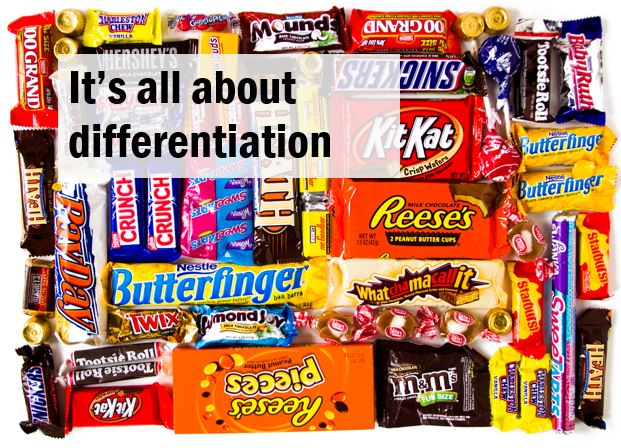Or: How to create a personal brand, even if you don’t think you’re a unique snowflake.
I know – just what you wanted: Another blog post about personal branding. But for all that’s been written and said about personal branding in the past 5+ years, I still find myself getting asked about it by people who are fantastic at what they do, but who aren’t getting the recognition they deserve because they haven’t really figured out how to build their own personal brand.
This is what I tell them.
Chocolate bars:
Four basic ingredients. Almost infinite positioning.
No industry has done a better job of branding a commoditized product than what the North American and British confectionery indutries have done with chocolate bars (or ‘candy bars’, if you’re in certain parts of the USA).
Fundamentally, 99% of chocolate bars are exactly the same: Around 50g of the same four basic ingredients (chocolate, sugar, caramel and peanuts), combined in different ways.
And yet somehow we know that:
- OHenry bars are for when you’re really hungry
- KitKats are for when you just want a ‘break’
- MARS bars are good energy for sporty lives
- Smarties provide hours of amusement
- Hershey bars are somehow as patriotic as a bottle of Coca-Cola
I find it amazing that there are so many ways to combine and package the same basic ingredients to create such distinct offerings.
It’s time to start thinking of yourself as a chocolate bar.
It’s my belief that anyone who takes their career seriously and is even moderately ambitious should create their own personal brand, even if they never want to start their own company or consultancy. Being ‘known’ for something is also a great way to get ahead in a ‘regular’ career, because it helps employers and potential employers reach that ‘eureka’ moment when they realize that you’re a perfect fit for a particular role.
Spend too much time in the twitterverse or blogosphere and it’s easy to think that everyone’s creating personal brands all over the place these days. But in the real world, most people find it hard to deliver a compelling 2-sentence summary about why they’re different and better, let alone come up with a personal brand. They know it’s important; they just aren’t doing it.
So what’s stopping them?
Most of the time, it’s that they don’t really believe that they’re all that different or special than everyone else.
“I mean, I know I’m pretty good at my job and I think I know a lot about what I do, but I’m not exactly a visionary,” they tell me. “There are lots of other people doing what I do, and I’m not kidding myself that I’m some kind of genius. So what would my brand be about?”
Worrying that you’re not a genius misses the point: Branding is all about turning a commodity product into a special, premium or beloved one. You don’t have to be a ‘genius’; you just have to position your professional equivalent of 50 grams’ worth of chocolate, peanuts, caramel and sugar in a way that makes people think: “Whenever I need to solve [insert relevant business challenge here], I always think of [insert your name here] because s/he is an expert on [insert solution to relevant business challenge here].”
For example: “Whenever I think about branding in the small business space, I think about Sarah Welstead because she has done such great work for other companies I admire.” (!!)
You already have a great USP.
You just don’t know what it is (yet).
Here’s the thing: If you really are good at what you do, are committed to getting better at what you do, and are genuinely passionate about what you do for a living, chances are you’re already combining your 50g of basic ingredients in some kind of unique way – you just don’t realize it.
So ask 5 colleagues (present and past) for their input:
- Ask your boss why s/he hired you. What made you stand out from the other applicants?
- Ask your manager what things s/he ‘counts’ on you to provide (interesting ideas, super-fast work, lateral thinking, etc.)
- Ask your co-workers what they think you’re particularly good at – and tell them to include even stuff that seems irrelevant, like “Somehow you always manage to fix the photocopier”
- Ask subordinates/direct reports what they’ve learned from working with you (this one may be the most revealing, because you may find that you’re highly respected for knowledge that you take for granted)
- Ask a trusted client why they like working with you
You’ll probably be pleasantly surprised by the responses you get – you may be inspiring or helping people in ways you never realized.
More importantly, once you know that colleagues think of you as a reliable partner or an inspirational leader, coming up with the basis of your personal brand will suddenly become a lot easier.


